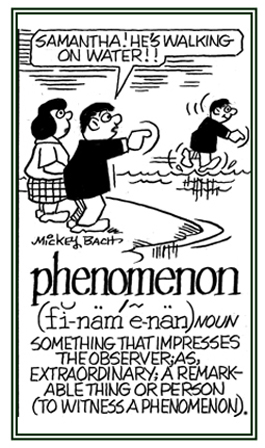2. Things that exist and can be detected by the senses; especially, things which are unusual or interesting: Donald believes in the paranormal and psychic phenomena that he has experienced.
3. Any states or processes known through the sensory faculties of the body rather than by intuition or reasoning: Lightning is an electrical phenomenon which many people have experienced.
4. In medicine: symptoms or occurrences of any sort, whether ordinary or extraordinary, in relation to a disease: Fever and inflammation are phenomena of physical ailments.
5. An unusual or extraordinary person, fact, or occurrence: A genius is sometimes called a phenomenon.
6. Etymology: from Greek phainomenon and Latin phaenomenom, "something which is seen or appears."

Go to this Word A Day Revisited Index
so you can see more of Mickey Bach's cartoons.
2. Any extremely unusual or extraordinary thing or occurrence that is known through the senses rather than known through thought or study: The neighbor was shocked with the phenomenon of a fire suddenly starting from an electrical explosion caused by her refrigeratorin her kitchen.
3. A fact of scientific interest that can be scientifically described, appraised, or explained: Gerald's chemistry instructor demonstrated the phenomenon of mixing chemicals to produce dyes for industrial purposes.
2. Very good or great; extremely unusual in a way that is very impressive: The book was a phenomenal success for several months.
Ed's phenomenal understanding of the single rare scientific phenomenon of ice crystals was amazing; however, he lost points in his essay by referring to it as a single rare scientific phenomena.
The surface is ordinarily either a solid particle suspended in the solution or the medium through which the solution flows.
The process includes the combined electrical and magnetic effects exhibited by and used by equipment, apparatus, and instruments; and, in terms of radiation, to describe the radiation which is associated with a periodically varying electric and magnetic field that is traveling at the speed of light; such as, light waves, radio waves, X-rays, gamma radiation, etc.
2. Unusual, significant, or unaccountable facts or occurrences; marvels.
2. A remarkable, talented, and unusual individual or event: Beethoven was considered to be a phenomenon among musicians.
The normal plural form of phenomenon is supposed to be phenomena; however, phenomenons is also usually acceptable when referring to people or things: Reckless speculators are phenomenons among today's investors.
Phenomena is the correct plural form for scientific content: The phenomena were observed by astronomers throughout the world.
Tomorrow's weather forecast calls for several atmospheric phenomena.
A theory can lead to a new conclusion or the discovery of a phenomenon. Developments of a theory often result in a change in paradigm; that is, looking at or thinking about a scientific problem in a totally different way as indicated by a set of assumptions, concepts, values, and practices that constitute a way of viewing reality for the scientific community that shares them.
